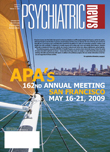A day-long course designed to help international medical graduates (IMGs) adapt to the fundamentals of psychiatric practice in the United States debuted at last year's annual meeting. Based on the positive reception it received, the International Medical Graduates Institute has again been put on the annual meeting schedule.
The course, which will be held Sunday, May 17, from 9 a.m. to 4 p.m. at the Moscone Center, is designed for PGY-2 to PGY-4 residents who trained in medicine outside the United States. It's modeled after a program developed for IMGs training in family medicine at Canada's McMaster University (Psychiatric News, April 18, 2008). The initiative is made possible through collaboration with McMaster University faculty, the Educational Commission for Foreign Medical Graduates (ECFMG), and the Group for the Advancement of Psychiatry.
“IMGs' heterogeneity in their cultural, educational, and linguistic background is both an asset and an obstacle to their success as residents,” Nyapati Rao, M.D., director of the institute, told Psychiatric News. “A recently arrived resident may find the American health care system vast and complex, the educational demands in residency challenging, and the sociocultural norms hard to fathom. Our institute, by addressing these issues in a sensitive manner, is expected to orient the residents to their U.S. experience.”
Rao is chair of the Department of Psychiatry and Behavioral Sciences at Nassau University Medical Center in East Meadow, N.Y.
“We hope,” he added, “that the knowledge, skills, and cultural insights gained from this experience will form the foundation on which IMGs can build their future identity as psychiatrists.”
The institute's sessions cover supervision and feedback, cultural diversity in the U.S. health care system, and special issues of communication and the doctor-patient relationship in psychiatry, said Deborah Hales, M.D., in an announcement of the institute sent to residency training directors and psychiatry departments around the country. Video vignettes and small-group discussions also will be used. Hales is director of the APA Office of Education and Career Development.
The faculty will include Peter Buckley, M.D., chair of the Department of Psychiatry at the Medical College of Georgia. He will kick off the program by interviewing a panel of recently graduated IMG psychiatry residents about their experiences in this country and their training programs. A native of Ireland, Buckley can relate as he was introduced to the American practice of psychiatry at Case Western Reserve University.
Also on the faculty will be Priyanthy Weerasekera, M.D., M.Ed., director of psychotherapy training at Canada's McMaster University. She offered a“ superb,” well-received session last-year on communication, psychiatric interviewing, and the therapeutic alliance, Hales noted.
Weerasekera is “one of the most sought-after teachers about therapeutic alliance and communication issues,” Hales said. “Her sessions are outstanding and will be addressing communication issues faced particularly by IMGs.”
Last year's participants “liked all the presentations,” said Rao, especially “the afternoon presentations by the ECFMG on the American health care system, including legal and financial issues.... The recommendation was that APA must offer this course every year.”
